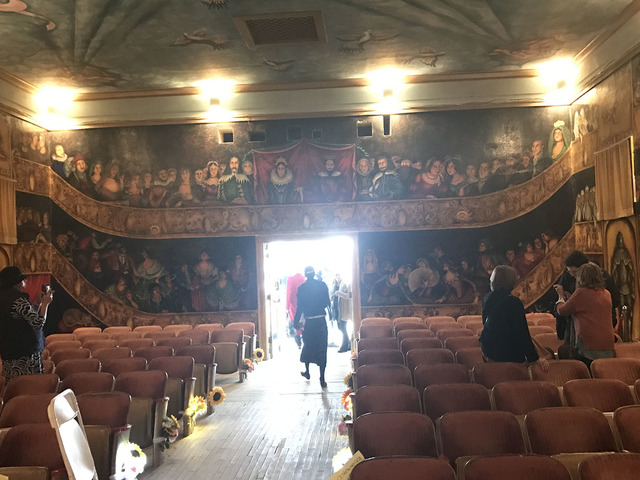
Amid concerns for the future of the Amargosa Opera House, friends and business associates of Marta Becket, the 92-year-old legendary dancer and artist who died on Jan. 30, say they are working to rectify bookkeeping errors that put the corporation’s nonprofit status in jeopardy.
Fred Conboy, a former UNLV fundraiser who now lives in Kansas, said he was surprised to discover he was the “last man standing” on the organization’s board of directors.
“But I am not alone in this,” he said. “Marta had a wide circle of friends who stand by her vision.”
A celebration of Becket’s life was held at the Opera House last Saturday, drawing a standing-room-only crowd that packed the famous theater where she painted murals covering the walls and ceilings, and where she danced shows of her own creation for 45 years.
Just the day before, the Las Vegas Review-Journal published an article revealing that Amargosa Opera House, Inc., had failed to file the required paperwork to retain their nonprofit status and that the corporation had gone delinquent.
According to the state of California’s notice, the corporation has until early March to file the proper paperwork and pay any associated fines or lose their registration and ability to do business. Peter Simon, a long-time financial advisor and friend of Becket, said this can be easily done and that the delinquency was an accidental oversight. That the notice came so near the time of Becket’s death was an unfortunate coincidence, Simon said.
The notice stated that the nonprofit had failed to renew its registration since 2011, and had also failed to file certain IRS forms since 2011.
“We’ve mostly been concerned with Marta’s well-being and keeping her in Death Valley to live out the rest of her days. We accomplished that.” But the paperwork, he said, “we just let that slip.”
When the delinquency notices arrived, Simon said, the nonprofit began looking for an attorney with experience in nonprofit law and recently hired Brian Yacker, an attorney specializing in nonprofit finances.
The state of California’s warning to the Opera House indicates that any fines incurred will be the personal responsibility of the members of the board of directors. At present, with Becket’s death and the disability of a third member, the responsibility falls to Fred Conboy. Conboy said he and others are prepared to cover the costs if they can. “We will dig deep, contribute personal financial resources,” he said, to the extent that personal finances allow.
As yet, no one associated with the Opera House has received a figure from the state of California requesting fees, if any. Although the state’s notice stated that late fees would be imposed, Attorney Simon said he did not expect any extra fees once the corporation filed all the appropriate paperwork along with an appeal. The state of California did not respond to requests for further information.
As for rebuilding the board of directors of the nonprofit, “We don’t have a clear road map,” Conboy said. “We will marshal everyone’s collective resources, some of which will be financial, some labor, some talent. We want to work on preservation, all kinds of infrastructure issues. The Opera House is the single most important asset and we are always asking how best to do the preservation.”
The board has a three-member structure, and since Conboy lives in Kansas and is caring full time for family members, he is unable to be on site to help guide the transition. This is where Attorney Simon says the new nonprofit attorney can help them correct any outstanding issues and get on with the business of protecting Becket’s dream for a center for arts and culture. Simon said other longtime friends of Becket’s had stepped forward, offering to fill the vacant board positions.
With so many immediate and pressing needs for repair, especially to the walls of the Opera House and surrounding structural issues, Conboy, Simon and others indicated that running the multi-faceted nonprofit and ensuring proper care for the aging Becket was a constant juggling act.
Sometimes, said General Manager Rhonda Shade, “I might have let the power bill go to fix the walls, but I wouldn’t let the lights get turned off. Everything always got paid.”
“I’m not saying we don’t have issues,” said Shade. “But it’s not fair to Marta’s legacy for that to be the focus. We’ll rise above this, just check back in a few weeks.”
Shade said she had been working with Becket to curate a collection of Becket’s stage memorabilia for display in an onsite museum that opened the day of the celebration of life. She said she will continue to work to preserve Becket’s legacy, especially in terms of artifacts, papers and artworks that Becket left behind.
Becket’s possessions, said Conboy, belong to the nonprofit and have been video-inventoried. When the nonprofit board of directors is fully functional, it will work with Shade to oversee the preservation and protection of the collection, which has significant cultural and historical value.
While the Opera House is always in need of financial support, Conboy said the organization can not legally receive donations until the nonprofit status is reinstated. He encouraged contributors “to hold off until our house is in order”, and check back next month and for further updates.
Meanwhile, Conboy says he feels a moral obligation to protect the Opera House and Becket’s vision. Especially the murals and Becket’s stage. “It’s forever new to me,” Conboy said. “Every time I visit it’s always revealing some new truth, some new beauty.”
“We will ensure that Marta’s Opera House legacy survives,” Conboy said. In the face of somewhat staggering challenges, “Am I being an idealist? Marta was an idealist. If she weren’t she wouldn’t have been out here dancing, she wouldn’t have endured here for 49 years.”
Robin Flinchum is a freelance writer and editor living in Tecopa, California. Her book, “Red Light Women of Death Valley,” was published last year.